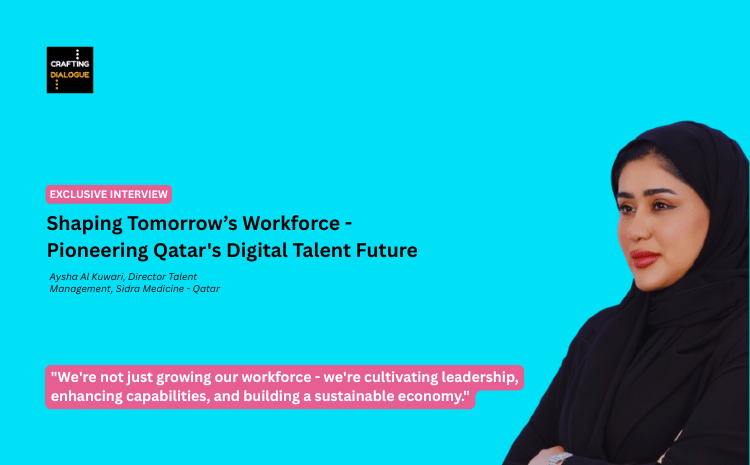Shaping Tomorrow’s Workforce: A Conversation with Talent Strategist Aysha Al-Kuwari

Strategic Insights from a Pioneer in Qatar’s Talent Development Landscape
We interviewed Aysha Al-Kuwari, Director of Talent Management at Sidra Medicine, about her strategic approach to workforce development and her vision for Qatar’s talent future.
With over 17 years of experience spanning diverse organizations, Aysha Al-Kuwari has established herself as a formidable strategist in talent development. Her journey from Qatar University to Mashreq Bank, Qatar Airways, and now Sidra Medicine has equipped her with a unique perspective on building future-ready workforces through innovative people strategies.
Strategic Adaptability Across Diverse Environments
When asked about how various environments have shaped her approach to talent management, Aysha emphasizes strategic adaptability as the cornerstone of success. “I have been deeply influenced by Talent Management surrounding the environment, whether it’s cultural, economic, technological, or organizational,” she notes. This forward-looking mindset has enabled her to anticipate how different industries, regions, and workplace cultures will shape tomorrow’s employee expectations, motivations, and performance.
Architecting Qatar’s Workforce Future Through TAWTEEN
Aysha speaks passionately about Qatar’s national vision and the strategic TAWTEEN initiative, which aims to transform the participation of Qatari nationals in the workforce.
“I’ve been working in HR for 17 years and Qatarisation wasn’t just part of my responsibilities; I always took it as a commitment toward my country,” she shares.
“It’s not just about filling jobs with national workforce,” Aysha clarifies, “but mainly about developing national leadership, enhancing skillsets, and creating a sustainable economy.” This strategic perspective demonstrates her focus on long-term workforce planning rather than short-term staffing solutions.
Engineering Dynamic Career Pathways
Drawing from her extensive experience designing development programs, Aysha highlights several strategic approaches to internal mobility that create future-ready career pathways:
“To develop such programs within the organization, it is crucial to understand the organization’s vision and strategies towards staff development. Additionally, leadership support is essential for designing and launching these programs,” she emphasizes.
Her forward-looking strategies include:
• Learning & Development (70-20-10): Implementing skill badge systems that enable career progression based on demonstrated proficiency rather than formal education alone
• Strategic Rotation Programs: Facilitating short-term projects across departments that prepare employees for the multidisciplinary demands of future roles
• Data-Driven Career Development: Creating personalized career paths based on predictive analysis of strengths and organizational needs
Leveraging Technology as a Strategic Advantage
On digital transformation’s impact on talent management, Aysha identifies AI-powered learning and development platforms as strategic investments. “Instead of one-size-fits-all training, AI-driven platforms provide personalized learning recommendations based on employees’ skills, career goals, and real-time job demands. Adaptive learning paths ensure continuous growth and engagement.”
This technology-forward approach positions organizations to develop the agile workforce capabilities required for future success.
Building Tomorrow’s Leadership Model
Aysha believes the most strategic aspect of future-focused leadership is “the ability to empower diverse voices, not just by acknowledging differences but by actively integrating them into decision-making.”
“This goes beyond representation,” she explains. “It’s about psychological safety—creating an environment where people from all backgrounds feel heard, respected, and encouraged to challenge ideas without fear.”
Aysha identifies three reasons why inclusive leadership is particularly relevant today:
1. Employees demand authenticity, valuing leaders who appreciate uniqueness rather than enforcing conformity
2. Hybrid and remote work environments require intentional inclusion strategies
3. Diversity demonstrably fuels business success, with diverse teams consistently outperforming homogeneous ones Last Question pending for the article
Transformative Vision for Qatar’s Talent Landscape
Representing the vanguard of strategic talent management in the region, Aysha Al-Kuwari shared her perspective on the emerging trends she’s most excited to explore, particularly three key emerging talent trends that are shaping the future of the digital workforce in the region:
1. AI-Driven Talent Development
The integration of AI and machine learning into talent practices is transforming how we identify, develop, and retain high-potential talent. I’m eager to explore how we can leverage AI not only for skills matching but also for personalized learning and upskilling pathways—ensuring our workforce evolves as fast as the technology itself.
2. The Rise of Skills-Based Hiring and Workforce Agility
There is a growing shift from degree-based to skills-first hiring. I hope to engage with fellow leaders on how we can build more agile, competency-based ecosystems that prioritize continuous learning, certifications, and project-based experience. This is especially vital as traditional career pathways are being redefined.
3. Local Talent Empowerment and Global Competitiveness
Qatar has a unique opportunity to cultivate a robust digital talent pipeline by empowering local talent through education, mentorship, and strategic partnerships. I look forward to contributing ideas on how we can balance the nurturing of local talent with the integration of global best practices, positioning the region as a digital innovation hub.
Ultimately, my goal is to influence the future of talent practices by encouraging a people-centered, tech-enabled approach—where we design systems that are inclusive, data-informed, and future-ready. If we align our strategies today, we can shape a resilient, adaptive workforce that thrives in the digital economy of tomorrow.”
This conversation only scratches the surface of Aysha’s groundbreaking approach to talent development and the potential of a growing and robust digital talent ecosystem.